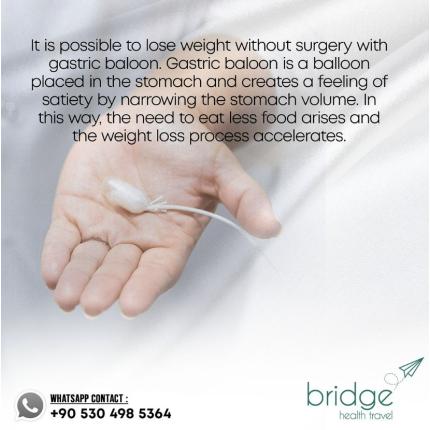What is a Gastric Balloon?
Calculate Your Cost / Price
The World Health Organization defines obesity as the excessive accumulation of fat in the body. According to the criteria of the World Health Organization, obesity can be defined when the body mass index is above 30. It is well known that there are many health problems associated with the global epidemic of obesity. These include serious health problems such as cardiovascular diseases, diabetes, and hypertension. Therefore, obesity needs to be treated not only for aesthetic purposes but also for a healthy life. Nowadays, there are many surgical and non-surgical options available for the treatment of obesity. The decision regarding which treatment to apply to an obese patient is made by considering factors such as the patient's height, weight, age, and general health condition under the supervision of an expert doctor. Gastric balloon is one of the commonly preferred non-surgical treatment methods for obesity. The main purpose of gastric balloon treatment is to reduce the amount of food consumed in a single meal and provide a long-lasting feeling of fullness. Gastric balloons are silicone devices that are inserted into the stomach and can remain there for a certain period of time. The gastric balloon procedure involves placing a deflated balloon into the stomach and then inflating it with saline or a biocompatible and approved blue dye. The inflated balloon occupies more than half of the stomach. The amount of inflation is determined during the procedure, considering that everyone's stomach structure and anatomy are not the same. The endoscopic gastric balloon procedure takes approximately 30 minutes to 1 hour.
FQ About Gastric Balloon Clinic in Antalya / Turkey
Pages
-
£ 1580£ 1450GASTRIC BALLOON PROCEDURE PACKAGE
Give a call to learn more about what’s included and to come up with a tailored plan if you need unique accommodations that are not listed below.
- Airport
- Hotel
- Hospital transfer
- The balloon is placed via endoscopy, the procedure takes 15-20 minutes and you are discharged after 2-3 hours. It is enough to stay here for 1 night.
- Blood samples & x-rays
- 5 year follow up
-
£ 2750£ 2550GASTRIC SLEEVE PACKAGE
GASTRIC SLEEVE PACKAGE COST TURKEY / ANTALYA
Give a call to learn more about what’s included and to come up with a tailored plan if you need unique accommodations that are not listed below.- Airport
- Hotel
- Hospital transfer
- 4 day stay at hospital
- Blood samples & x-rays
- 5 year follow up
-
£ 3100£ 2900MINI GASTRIC BYPASS PACKAGE
MINI GASTRIC BYPASS PACKAGE TURKEY
Give a call to learn more about what’s included and to come up with a tailored plan if you need unique accommodations that are not listed below.- Airport
- Hotel
- Hospital transfer
- 4 day stay at hospital
- Blood samples & x-rays
- 5 year follow up













